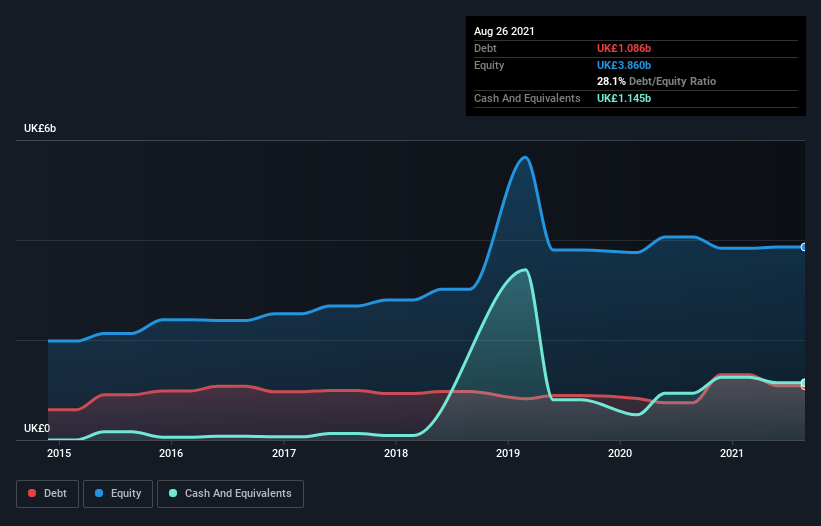
Warren Buffett famously said, 'Volatility is far from synonymous with risk.' When we think about how risky a company is, we always like to look at its use of debt, since debt overload can lead to ruin. As with many other companies Whitbread plc (LON:WTB) makes use of debt. But the more important question is: how much risk is that debt creating?
What Risk Does Debt Bring?
Debt and other liabilities become risky for a business when it cannot easily fulfill those obligations, either with free cash flow or by raising capital at an attractive price. In the worst case scenario, a company can go bankrupt if it cannot pay its creditors. However, a more common (but still painful) scenario is that it has to raise new equity capital at a low price, thus permanently diluting shareholders. Having said that, the most common situation is where a company manages its debt reasonably well - and to its own advantage. When we examine debt levels, we first consider both cash and debt levels, together.
Check out our latest analysis for Whitbread
What Is Whitbread's Net Debt?
The image below, which you can click on for greater detail, shows that at August 2021 Whitbread had debt of UK£1.09b, up from UK£747.3m in one year. However, it does have UK£1.14b in cash offsetting this, leading to net cash of UK£59.0m.

How Healthy Is Whitbread's Balance Sheet?
The latest balance sheet data shows that Whitbread had liabilities of UK£723.3m due within a year, and liabilities of UK£4.32b falling due after that. Offsetting this, it had UK£1.14b in cash and UK£120.8m in receivables that were due within 12 months. So its liabilities outweigh the sum of its cash and (near-term) receivables by UK£3.78b.
Whitbread has a market capitalization of UK£6.68b, so it could very likely raise cash to ameliorate its balance sheet, if the need arose. However, it is still worthwhile taking a close look at its ability to pay off debt. Despite its noteworthy liabilities, Whitbread boasts net cash, so it's fair to say it does not have a heavy debt load!
Notably, Whitbread made a loss at the EBIT level, last year, but improved that to positive EBIT of UK£86m in the last twelve months. There's no doubt that we learn most about debt from the balance sheet. But it is future earnings, more than anything, that will determine Whitbread's ability to maintain a healthy balance sheet going forward. So if you're focused on the future you can check out this free report showing analyst profit forecasts.
Finally, while the tax-man may adore accounting profits, lenders only accept cold hard cash. Whitbread may have net cash on the balance sheet, but it is still interesting to look at how well the business converts its earnings before interest and tax (EBIT) to free cash flow, because that will influence both its need for, and its capacity to manage debt. During the last year, Whitbread burned a lot of cash. While investors are no doubt expecting a reversal of that situation in due course, it clearly does mean its use of debt is more risky.
Summing up
Although Whitbread's balance sheet isn't particularly strong, due to the total liabilities, it is clearly positive to see that it has net cash of UK£59.0m. Despite its cash we think that Whitbread seems to struggle to convert EBIT to free cash flow, so we are wary of the stock. Given our hesitation about the stock, it would be good to know if Whitbread insiders have sold any shares recently. You click here to find out if insiders have sold recently.
When all is said and done, sometimes its easier to focus on companies that don't even need debt. Readers can access a list of growth stocks with zero net debt 100% free, right now.
Valuation is complex, but we're here to simplify it.
Discover if Whitbread might be undervalued or overvalued with our detailed analysis, featuring fair value estimates, potential risks, dividends, insider trades, and its financial condition.
Access Free AnalysisThis article by Simply Wall St is general in nature. We provide commentary based on historical data and analyst forecasts only using an unbiased methodology and our articles are not intended to be financial advice. It does not constitute a recommendation to buy or sell any stock, and does not take account of your objectives, or your financial situation. We aim to bring you long-term focused analysis driven by fundamental data. Note that our analysis may not factor in the latest price-sensitive company announcements or qualitative material. Simply Wall St has no position in any stocks mentioned.
Have feedback on this article? Concerned about the content? Get in touch with us directly. Alternatively, email editorial-team (at) simplywallst.com.
About LSE:WTB
Whitbread
Operates hotels and restaurants in the United Kingdom, Germany, and internationally.
Good value with adequate balance sheet and pays a dividend.


